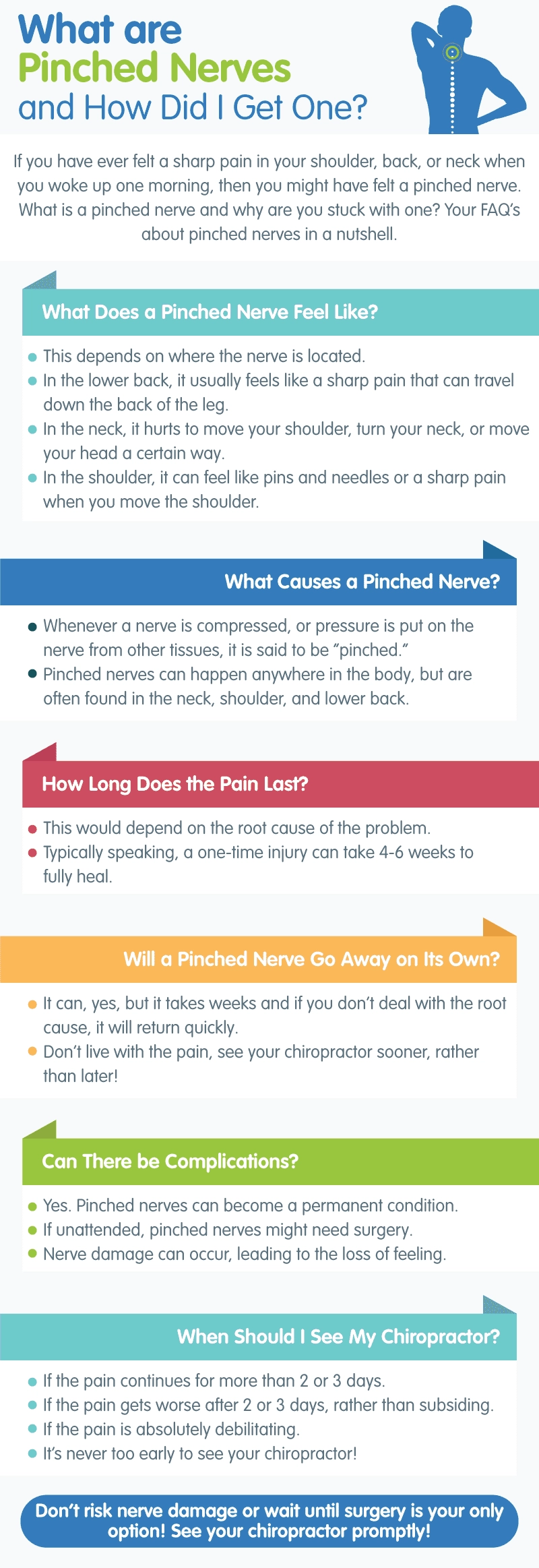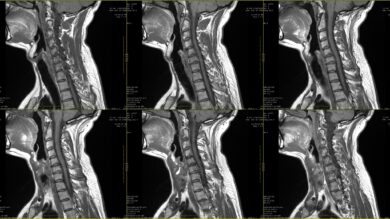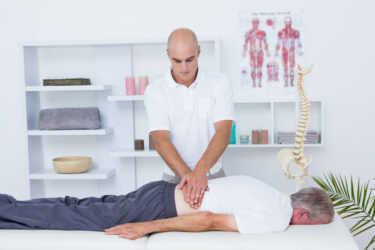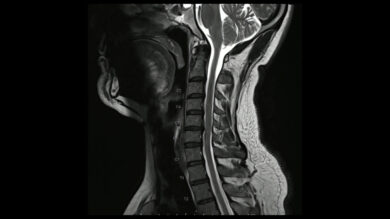11 Secrets for Getting Rid of a Pinched Nerve

You wake up one morning and there it is– that sharp pain that sends you reeling. Or maybe you feel numbness in your arm and pain when you move your shoulder and you wonder if you slept on it wrong. These are classic signs of a pinched nerve in the neck or shoulder.
Someone mentions that you might have a pinched nerve and wonder if this is the case. What exactly is a pinched nerve and, perhaps foremost in your mind, how do you get rid of a pinched nerve?
You should never put off the pain of a pinched nerve for very long as it can lead to serious complications. The source of your pain will also need to be identified and verified since the pain of pinched nerves is similar to the pain from other health conditions. Your pinched nerve could also be caused by a more serious health problem, such as degenerative disc disease or spinal stenosis.
A pinched nerve will often need to be treated by your chiropractor, but you can try these other treatments and see if you find some pain relief.
What can you do for pinched nerves? Let me, your top-rated chiropractor in Juneau, fill you in on the little-known secrets for dealing with the pain caused by pinched nerves, no matter where they are in the body.
Secret #1: Pinched Nerve Home Remedies
Home remedies, sometimes called folk remedies, have been used since time immemorial to treat the pain of pinched nerves. While some are a bit outlandish, some can be effective. Try some of the following home remedies for your pinched nerve pain:

Rest – That seems like an obvious one, but many people have such jam-packed schedules that they don’t allow their bodies enough amounts of time to rest and heal.
Hot showers or baths – This will loosen muscles and can offer pain relief
Chamomile tea – This tea is known for it’s calming and anti-spasmodic compounds. Drinking a few cups of chamomile tea throughout the day can offer pain relief
Garlic & Mustard compress – This is an age-old remedy that appears to work well for minor pain. Crush a few cloves of garlic in a tablespoon of mustard oil and apply to the affected area, covering it with a warm cloth.
Honey & cinnamon – Another old remedy is to mix a teaspoon of cinnamon in a tablespoon of honey and apply this as a compress.

Secret #2: Get Rid of a Pinched Nerve in the Neck
What a pain in the neck! We’re talking about a pinched nerve here, not your in-laws, but the result is the same; an intense and sharp pain when you turn your head.
Sometimes, what is commonly called a pinched nerve in the neck is nothing more than an irritated and inflamed cervical joint. Other times, it can be due to degenerative disc disease or a bulging disc.
How can you tell the difference? You really can’t without x-rays or an MRI, but if you wake up with a kinked neck, you can try the following:
- Rest and wait it out for 24-36 hours. If the pain improves or goes away, chances are that you simply slept on it wrong or you “wrenched” your neck muscles by moving your head too fast.
- Take things easy for 48 hours. If you normally lift heavy items or look down at a laptop all day, modify your activities so your neck can “take a break.” (Not literally, of course!)
- Try ice therapy. Ice will reduce swelling, inflammation, and relieve the pain. Try 15 minutes on and then 15 off for two or three hours per day.
- Gently, gently, VERY gently, stretch your neck. If it hurts to stretch it, STOP.
If you don’t feel improvement in two days or if the pain gets worse, see your chiropractor right away!
Secret #3: Get Rid of a Pinched Nerve in the Back

A pinched nerve in the lower back is perhaps one of the most common places a pinched nerve happens. This can be due to inflammation from overused muscles, a bulging disc, an injury to the back, obesity, arthritis, or even bone spurs.
Diagnosis is important here, but in the meantime, you can often find at least some relief from a pinched nerve in your back by trying some of the following methods:
- Try elevating your legs. Lie on your back and bend your knees towards your chest, as if you were sitting down. Put a pillow under your knees. This relieves pressure on the lower back. Allow your back to rest for 24 hours.
- Ice therapy is often helpful in dealing with pain. Apply an ice pack to your back for 20 minutes on then 20 minutes off. Always wrap ice in a towel or cloth to avoid frostbite to the skin
- Use lumbar support pillows to help support your lower back.
- Try an infrared heating pad
- Squeeze that booty. Before you stand up, sit down, or bend over, take a few seconds to squeeze your butt cheeks hard. This stabilizes the back and can reduce any abnormal movements that can irritate your pinched nerve even more.
- We mention both ice and heat for a pinched nerve and many people ask is ice or heat better for a pinched nerve? The answer is both. Ice can reduce swelling, while heat brings fresh blood and nutrients to the area, providing healing. Alternating between ice and heat is generally best.
If you feel no relief from the pain within 48 hours, or if the pain gets worse despite these treatments, call your chiropractor ASAP. Ignoring a pinched nerve can lead to permanent nerve damage and the loss of bladder control.

Secret #4: Get Rid of a Pinched Nerve in the Shoulder
A pinched nerve in the shoulder is absolutely no fun. Sometimes, you can’t even stand without feeling pain. There are a variety of reasons why a nerve in the shoulder gets pinched, including being overweight, carpal tunnel syndrome, pregnancy, an injury to the shoulder, and other conditions, such as arthritis.
A pinched nerve in this area is super annoying because it limits what you can do. Unfortunately, there aren’t a great many ways to help shoulders, but you can try some of the following methods:
- Rest. While it might seem downright dumb, complete rest of the area, which means not moving your arm, hand, or shoulder, can help the nerve to calm down in 48 hours. If you find yourself forgetting to not use your arm, use an elastic bandage to “tape” your arm to your side.
- Practice good posture. Sometimes, simply standing and sitting up straight can make all the difference by relieving pressure on the nerve.
- Try hot or cold compresses. Many people find relief by alternating between ice packs used for 20 minutes, then heat packs used for 20 minutes. This reduces swelling, inflammation, and relieves pain. Read more about it in my other blog post discussing this in great details.
- Sleep on your back or on the opposite side from the pinched nerve. Avoid placing pressure on that shoulder by keeping your weight off of it.
- Drink chamomile tea. This type of tea is a known muscle relaxant that can take the pressure off the nerve if the cause is from a pulled or tight muscle.
If you don’t feel relief or less pain within 48 hours, call your chiropractor for an appointment. Ignoring shoulder pain can lead to a frozen shoulder or permanent nerve damage.
Secret #5: Check Your Attitude

Believe it or not, the power of positive thinking is a real thing. While it might not be true that just thinking about being well will actually heal the body, but numerous studies, such as this one, have found that people who believe that they will get well, that their doctor was doing the right thing, that they were an active participant in their healing process, and that they would heal quickly, did exactly that. They healed faster and felt better about life and their treatment overall than those who felt sorry for themselves.
It can be difficult to remain positive when you are in pain, but it can be done. Try some of the following attitude adjustments:
- Refocus your attention elsewhere
- Surround yourself with positive, supportive people
- Make a list of all the good things in your life
- Make a list of positive affirmations and say them daily
- Tell yourself out loud that you are healing, and things will be better
- Try to do things you really love
- Play upbeat music
- Take a humor break by watching funny videos or a sitcom you really love
You are what you say you are, so tell yourself that you are on the road to recovery and you will be.
Secret #6: Healthy Lifestyle Changes

While the cause of a pinched nerve might not be anything you can avoid, such as in the case of degenerative disc disease or spinal stenosis, there are a few lifestyle changes that will help your pinched nerve heal faster and prevent a reoccurrence for some people.
Consider making some of the following changes to your life to improve your health including:
- Improve your posture. Ask your chiropractor if you are unsure of what good posture should be
- Stop smoking. Smoking greatly increases the amount of time needed for healing
- Eat a mainly plant-based, anti-inflammatory diet
- Lose extra weight to prevent putting extra pressure on the nerves
- Avoid sitting for long periods of time
- Get 7-9 hours of rest each night to allow the body time to repair itself
- Don’t drink to excess
- Eat plenty of calcium rich foods if you suffer from osteoporosis
- Get at least 30 minutes of exercise each day (after your pinched nerve heals, of course!)
- Get regular check-ups from your doctor, dentist, and chiropractor
Secret #7: Herbal Treatments & Diet
Herbal treatments and supplements are age old ways for dealing with the pain of a pinched nerve, as well as a means of avoiding a repeat performance. Common topical herbs used to ease pain include:
- Arnica
- St. John’s Wort
- Cayenne
- Lavender
- Wintergreen
You can use the above in creams, lotions, gels, or by mixing the essential oils with a few drops of a carrier oil such as coconut or olive oil. Apply the above to the affected area three or more times each day.
Herbal supplements are usually meant to stop inflammation and reduce pain. Some of these include:
- Curcumin-One of the best studied and most powerful anti-inflammatories around.
- Ginger– Also a well-known anti-inflammatory and anti-oxidative spice.
- Cayenne– Also known as Capsaicin. Yes, the same spice used to turn up the heat of your food is a super potent pain killer when applied topically.
- St. John’s Wort-Used in many countries to fight depression, this popular herb also has anti-spasmodic compounds and is an anti-inflammatory agent.
- American Skullcap– This is a very old herb used by the native Americans and pioneers to stop inflammation, relax the muscles, and calm nervous tension.
Of course, you should never consume any supplements, even herbal ones, without consulting your doctor, chiropractor, or pharmacist first to avoid a drug interaction. This is especially true if you are taking any type of prescription medications.
Of course, your body will take longer to heal if you aren’t eating a healthy diet. Nerve damage will heal more quickly if you increase the amount of dark green vegetables in your diet. You might also want to consider taking a multivitamin or adding the following vitamins to your diet while your body is healing from the pinched nerve:
- Vitamin B12
- Vitamin B6
- Calcium
- Potassium
- Magnesium
Always speak to your doctor, pharmacist, or chiropractor before taking any supplements, even so called “natural” remedies. Remember, even arsenic is a “natural” substance.
Secret#8: Physical Therapy Modalities & Physical Rehabilitation

Chiropractic care and physical therapy related treatments go together naturally, which is why you will find numerous chiropractic office with physical therapy modalities.
Physical therapy is a combination of exercises and stretching that not only offer pain relief, but gives you tools to strengthen and lengthen muscles in hopes of preventing a future occurrence.
You should not exercise the affected area until you have been diagnosed by your chiropractor. You might cause more damage or aggravate the nerve further if you do exercises improperly or do exercises that are wrong for your particular situation.
In addition to exercises and stretching, other modalities your chiropractor might employ include:
- Cold Laser Therapy
- Ultrasound
- DRS Device
Using physical rehabilitation and physical therapy modalities in Juneau will lead to less pain, faster healing, and an improved chance of never suffering from the pain of a pinched nerve!
Secret #9: Stretching and Yoga

Depending on where the pinched nerve is, stretching exercises and yoga can help to relive tension, reduce pressure, and thereby ease pain. It’s important not to stretch too deeply or do stretches quickly as this can make symptoms worse if you should strain muscles or damage connective tissues, such as tendons.
Yoga has been shown to help relieve the pain from pinched nerves by stretching the muscles. It also reduces inflammation and offers stress relief, which can irritate nerves.
Depending on where your pinched nerve is located, some of the best yoga poses for pain relief from pinched nerves would be:
- Seated Mountain Pose
- Angel Wings with Circles
- Ear to Shoulder
- The Baby Cobra
- Restorative Backbend
- 8 Point Shoulder Opener
- Cow Face Arms
For the lower back:
- Simple Seated Twist
- The Standing Twist
- The Cow Face
- King Pigeon Hips
- The Cobra
- Downward Dog
- Extended Side Angle
If you are not familiar with these poses or if you have never practiced yoga, we encourage you to seek out a qualified teacher in your area. It is important that the poses are done correctly to get the maximum benefit from them.
Secret #10- Chiropractic Massage
Massage has so many benefits, not to mention a natural means of stress and pain relief. Chiropractic massage is especially helpful for those with pinched nerves since the massage therapist works in the direction of the chiropractor. Your chiropractor will determine where the problem is and have the massage therapist pay special attention to the problem areas, as well as for deciding what type of massage would work best. Massage therapy will loosen tight muscles that pull bones and joints out of place, relieving pressure on the nerve.
Secret #11- Chiropractic Care
 One of the best and fastest ways to heal a pinched nerve, as well as prevent a future episode, is to see your chiropractor.
One of the best and fastest ways to heal a pinched nerve, as well as prevent a future episode, is to see your chiropractor.
Your chiropractor can diagnose, treat, and offer you other modalities, such as physical therapy, to get you back on the road and feeling like yourself again.
Pinched nerves are often the result of bulging or herniated discs, joints that are misaligned, and connective tissues that have become damaged and inflame, pulling muscles and bones out of place, putting pressure on the nerve. Here at Better Health Alaska, we offer to help stop the pain from back problems and relieve the pressure on pinched nerves caused by these common problems with our exclusive Alaska Back Pain Protocol treatment.
Since chiropractors are specialists in the musculoskeletal aspect of the body, it only makes sense that they will understand and discover where the root problem lies. They can then address the issue and take whatever steps are needed to relieve pain by reducing the pressure on the affected nerve.
Numerous studies show that chiropractic care is one of the best means of relieving pain and restoring full motion to the joints of the body.
Misaligned vertebrae in the spine, neck, or other misaligned joints can put pressure on a nerve, causing pain. Chiropractic adjustments realign the joints, reducing pressure, relieving inflammation, and allowing blood circulation to return to the area unrestricted, which brings fresh oxygen and nutrients to the damaged areas, allowing healing to take place.
Perhaps one of the best things about chiropractic care is that it is non-invasive and drug-free. Your chiropractor won’t just cover up your pain with addicting pain killers. They look for the root cause and treat both the cause, as well as relieve your pain and other symptoms.
Your chiropractor wants you to live a long and healthy life without physical restrictions. For the fastest and best way to rid yourself of the pain from a pinched nerve, see your local chiropractor.
Sometimes getting rid of your pinched nerve at home either isn’t in the cards or takes too long. But we’re here to help. We’ve helped thousands of Alaskans with their pinched nerves over the years, and we can help you.
 If you have found the information in this article helpful, feel free to share it with others.
If you have found the information in this article helpful, feel free to share it with others.
However, if you are suffering from a pinched nerve or any type of muscle or joint pain, you don’t have to just “learn to live with it.” Call one of our clinics for a same-day appointment and get your life back!

What Does a Pinched Nerve Feel Like?
Depending on where the pinched nerve is located, you can feel any of the following:
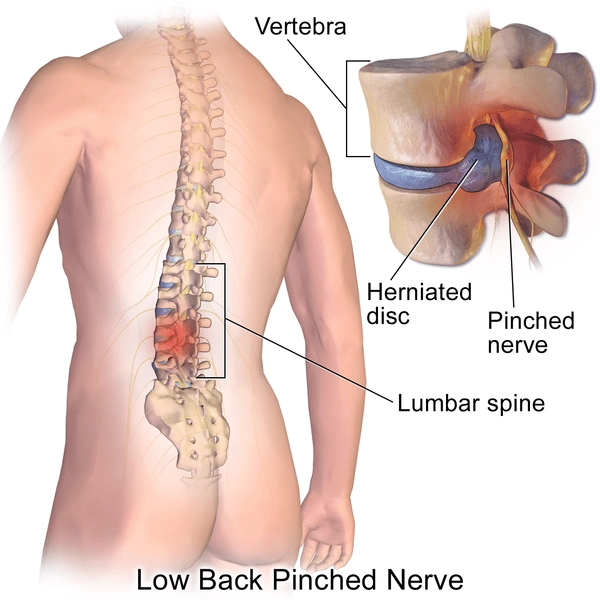 If it’s in the lower back-
If it’s in the lower back-
- A sharp pain in the back that goes down the leg and might go all the way to the foot
- This pain can be worse if you are sitting down or if you cough or sneeze
- Your leg or foot might feel numb
- Your leg can feel weak
If the pinched nerve is in your neck-
- Your shoulder hurts a lot to move it in any direction
- Sharp pain in the arm
- Weakness in the arm
- Feelings of pins and needles or numbness in the arm
- The pain is worse if you turn your head or if you move your neck
If the pinched nerve is in your shoulder-
- A tingling or pins and needle feeling in the shoulder
- Numbness
- A sharp pain when you move your shoulder
- A burning sensation in the shoulder when you use your arms
How Long Does a Pinched Nerve Last?
This is a difficult question to answer since it depends on several factors, including
- How long have you had this pain?
- Has this happened to you before?
- How bad is the pain?
How long the pain from a pinched nerve will last will also depend on what the root cause of the problem is. If it stems from a one-time injury, with proper treatment, most pinched nerves will heal in 4-6 weeks. If your pinched nerve is due to a health issue, such as degenerative disc disease, you might only be able to control the pain as your condition won’t really allow the nerve to heal.
What Causes a Pinched Nerve?
Basically, a nerve gets compressed or “pinched” when it receives too much pressure from surrounding tissues, such as muscles, tendons, bones, or cartilage. This pressure is unnatural and interrupts its normal function, causing it to send pain signals or not work properly, causing weakness or numbness.
A pinched nerve can happen almost anywhere in the body, but common places include the lower spine, wrists, shoulders, and neck.
Do Pinched Nerves Go Away on Their Own?
They can, yes. It can take several days to several weeks, but left alone, a pinched nerve will fix themselves and go away on their own in most cases.
Notice we said most cases. There is a point when you need to seek the attention of your chiropractor. If the pain gets worse over a few days, rather than improving, or if you suddenly have weakness in the area where the nerve is, then you should see a chiropractor ASAP.
Why deal with the pain of a pinched nerve for weeks, however, when you can stop the pain quickly by visiting your local chiropractor? No one deserves to live in pain and you shouldn’t have to “learn to live with it” when a chiropractor is just a phone call away.
Can a Pinched Nerve Lead to Complications?
Unfortunately, the answer here is yes. Pain is your body’s way of telling you that something is wrong, and it should not be ignored.
Can a pinched nerve become permanent? Yes. The longer a pinched nerve remains unaddressed, the more problems it creates. The protective barrier that surrounds a nerve can become irritated and begin to breakdown. This causes fluid to build up in the area, which is your body’s attempt to protect the nerve. This swelling of the tissue can lead to scarring and even more pressure on the nerve.
A pinched nerve should never be put off until “later” or taken lightly with a “let’s see how it goes” attitude. You are risking permanent nerve damage, which can lead to serious consequences, depending on where the nerve is located.
You can lose partial feeling in your arms or hands, be unable to move your shoulder, or in the case of the lower back, lose feeling in your leg or even lose control of your bladder and/or bowel function in extreme cases.
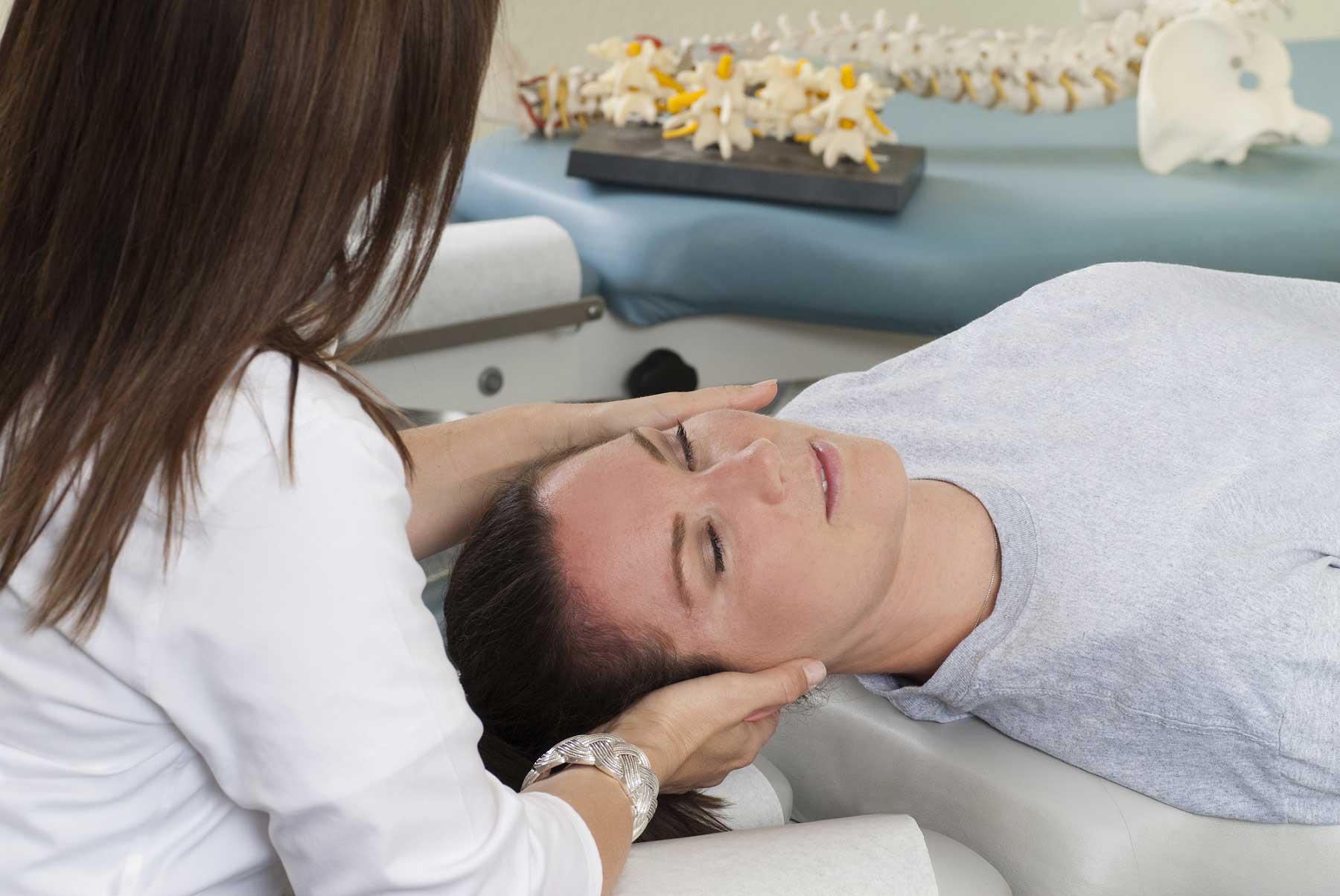
When Should I See a Chiropractor?
If the pain isn’t too severe and it started recently, you can try some of the 9 secrets listed here and see if the problem goes away on its own.
However, if the pain is debilitating or if there has been no improvement or if the pain has gotten worse over the past 7 days, you should see your chiropractor sooner rather than later.
A pinched nerve that is not treated can lead to permanent damage of the nerve or require surgery.
Schedule an Appointment, Receive a One-Hour Massage Certificate!
That’s right! Receive a certificate for a free one-hour massage with one of our highly-trained, professional, and licensed massage therapists for use after your first appointment. You can use it yourself, or give it to one of your family or friends for them to use!
What Can I Do to Stop This Pain?!
Pinched nerves can be annoying, or the pain can be intense. We know you are looking for relief and want to take action. Keep reading and try the 9 secrets for stopping the pain of pinched nerves.
You should also read this article about the things you should never do when you have a pinched nerve!
